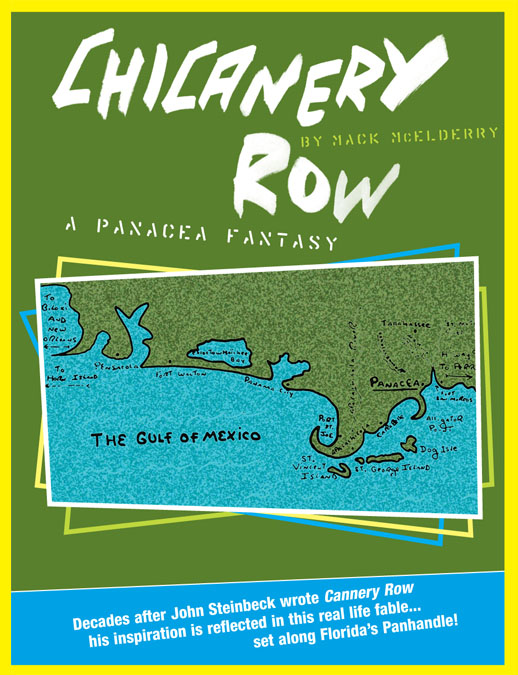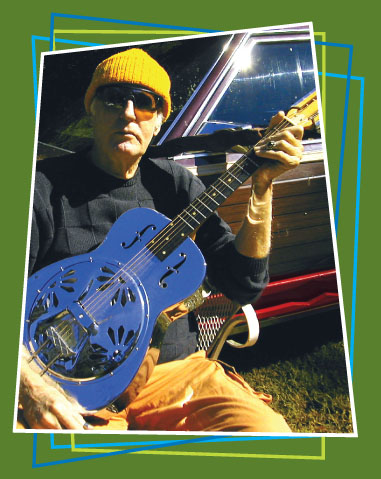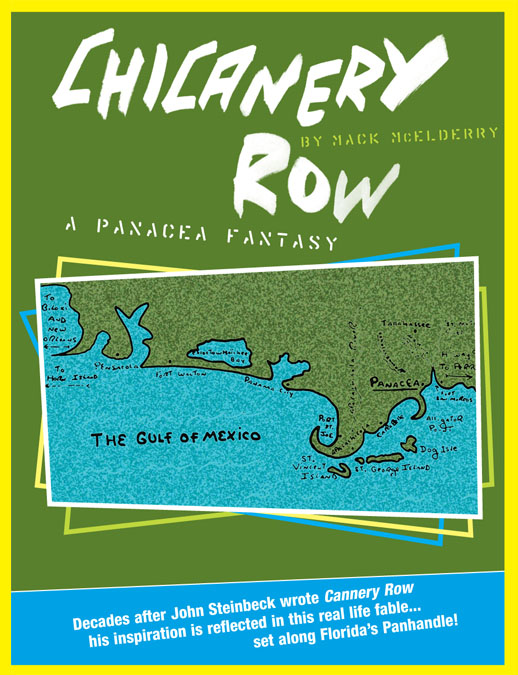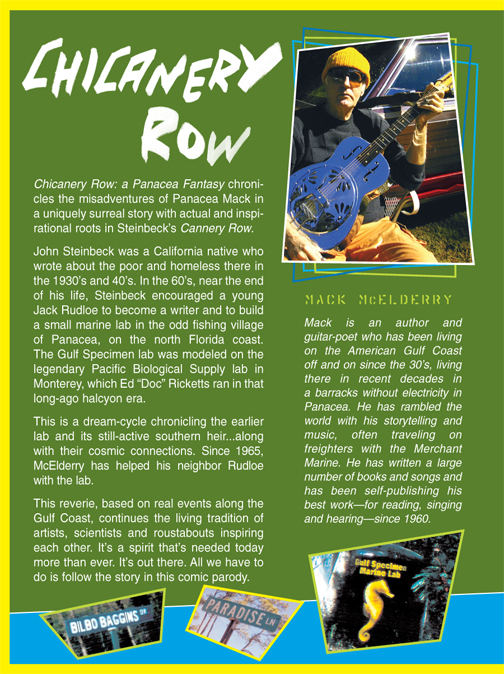Title: Chicanery Row
Author: Mack McElderry
[$5, postpaid in US. HUGE SALE!]
Here’s a $5 ZINEBOOK! Zines are cheap…so are ZINEBOOKS! Check it out! Pulp is back! The new pulp is here!
Folk writing is the next big thing. Until now it has not even been accepted as a form of folk art (writing is obviously literate and “folk” has been denied literacy). With “Chicanery Row” the mantle of progressive writing and culture (about people whose realities are usually glossed over) is passed from Steinbeck, Ricketts, and Campbell to McElderry, Rudloe and Anderson. Check it out. (Note: the mantle was hidden, covered, dropped during the time that academia had a death-grip on literary culture.)
Interestingly, this is a self-published book.
Possibly it’s not the smoothest-reading book, in terms of the kind of polish you may have come to expect from a generation of MFA-style buffed-up reading. But that’s because an artist wrote this book, someone who dedicated his life to the work, not the career. So it reads differently. Mack is also a musician. He earned his keep busking on the streets of the world for decades. He was in the merchant marine (still is, I think) and got to travel that way. Not the NPR way. This story is a people’s story.
FROM THE BACK COVER:
Chicanery Row: a Panacea Fantasy chronicles the misadventures of Panacea Mack in a uniquely surreal story with actual and inspirational roots in Steinbeck’s Cannery Row.
John Steinbeck was a California native who wrote about the poor and homeless there in the 1930’s and 40’s. In the 60’s, near the end of his life, Steinbeck encouraged a young Jack Rudloe to become a writer and to build a small marine lab in the odd fishing village of Panacea, on the north Florida coast.
The Gulf Specimen lab was modeled on the legendary Pacific Biological Supply lab in Monterey, which Ed “Doc” Ricketts ran in that long-ago halcyon era.
This is a dream-cycle chronicling the earlier lab and its still-active southern heir…along with their cosmic connections. Since 1965, McElderry has helped his neighbor Rudloe with the lab.
This reverie, based on real events along the Gulf Coast, continues the living tradition of artists, scientists and roustabouts inspiring each other. It’s a spirit that’s needed today more than ever. It’s out there. All we have to do is follow the story in this comic parody.
AUTHOR BIO:
Mack is an author and guitar-poet who has been living on the American Gulf Coast off and on since the 30’s, living there in recent decades in
a barracks without electricity in Panacea. He has rambled the world with his storytelling and music, often traveling on freighters with the Merchant Marine. He has written a large number of books and songs and has been self-publishing his best work—for reading, singing and hearing—since 1960.
EXCERPT:
From the chapter “Rickety Dock”…
Dock Rudloe limped noticeably and slowly around the huge yard of his biological supply company, humming a three-note tune, his old shoes keeping a contrasting rhythm in soft, sandy earth. Dock’s right knee had begun to bother him and he knew of no cure, short of a wheelchair or death. It was a fine autumnal Saturday morning—the very best season on that half-remembered coast; when the temperatures cooled, the bugs and tourists diminished and the fat silvery mullet schooled for their annual spawning runs. He picked up a white plastic five-gallon bucket that had several orange starfish resting in six inches of water on the bottom—someone had left it outside of the lab during the night. He looked down at the handsome creatures, reflecting on the numerous people who had brought specimens of one sort or another to the lab from the Gulf. There were, first of all, the older local fishermen, whom he’d come to know when he was still in high school. Daily, he had seen them discarding precisely the small sea creatures that he knew were in demand in labs all over America. When he had asked some of them if he could keep the starfish and sea-cucumbers and sea-pansies and seahorses and all of the other small Gulf creatures that they cast off as worthless, they were astonished. No one had ever had any use for such things in their lifetime.
Young Dock and those grizzled watermen had worked out a basic understanding as to what he needed and how much he could pay for each. Dock had written about those early years in his first published classic book, The Sea Brings Forth. Dock really liked that book; it was the one that John Steinbeck had read just before his death, after having helped Dock find a publisher.
In time, as word spread that Dock needed all sorts of things from the Gulf, his irregular collecting volunteers grew in number and discrimination. Dock, himself would make occasional trips along the local beaches or out on the Gulf in the Cyclops, the lab’s collecting boat, always his one good eye on the lookout for useful specimens…






